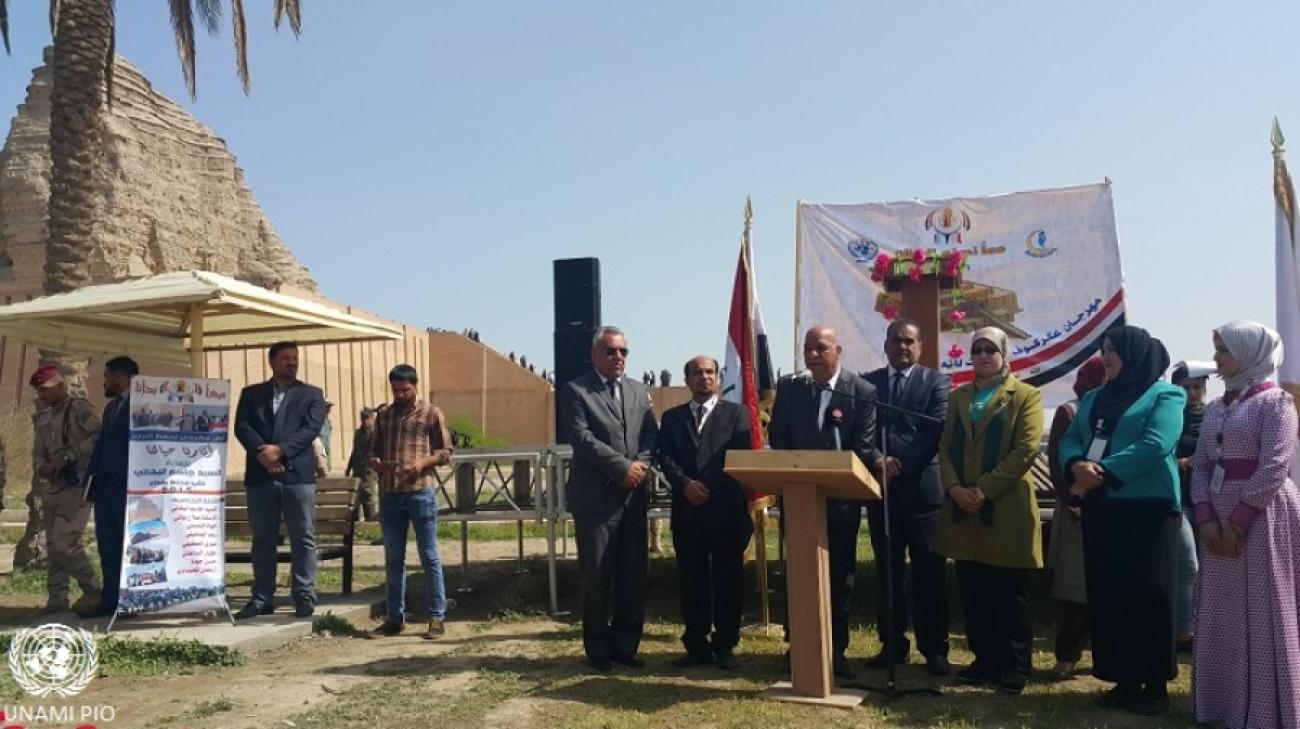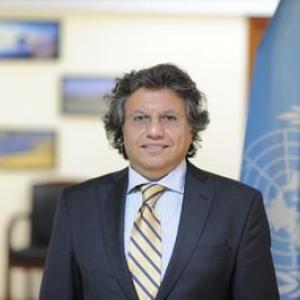ZIGGURAT AGARGOUF, 21 March 2017 - Perhaps no place is more befitting to press home the message of reconciliation and coexistence than Ziggurat Agargouf, the towering monument and a standing testament of Iraq’s rich heritage.
On 21 March of each of the past three years, the countryside in the western Baghdad suburb of Abu Ghreib comes alive with “The Agargouf Festival for Coexistence, Peace and Preserving the Heritage”. This year, it was a gathering of government officials, tribal leaders, and students from Anbar, Ninewa, Diyala and Baghdad governorates as well as a peace art exhibition where drawings depicting reconciliation and the fight against terrorism were displayed. Prominent Iraqi singer Amal Khdayer performed and a group of young girls in white dresses waving the Iraqi flag paraded.
The aim of the festival is to strengthen the engagement of civil society in national reconciliation efforts, but also to take lessons from the past: link Iraq’s proud past to its struggling present in order to instill hope that, despite the devastation caused by Daesh in recent years and the ongoing military drive to defeat the terrorist organization, Iraq will overcome the challenges and rise again to its old glory just like the ancestors did over and over throughout history.
The occasion under the theme of “Together We Make Peace” was organized by the United Nations Assistance Mission for Iraq (UNAMI) as part of its mandate to promote coexistence, tolerance and peace among Iraqis, in collaboration with the National Reconciliation committee in the Prime Minister’s Office, and Shams Al-Hayat Association with funding from the Ministry of Foreign Affairs of the Kingdom of the Netherlands and the Federal Foreign Office of the Republic of Germany.
The event coincided with the Nowruz holiday, celebrated by many in Iraq, as well as Mother’s Day and the beginning of spring, occasions that were not lost on the officials who delivered speeches.
The Deputy Governor of Baghdad, Mr. Jassem al-Bakhati, said the hope is that next year “will be the festival to celebrate the end of Daesh, the return to normalcy in Baghdad, peace in a society dominated by justice and fairness.” He also said today was a celebration of Iraq’s history and the women and mothers in this country.
Mr. Hussein Aladili, of the National Reconciliation Committee, was vocal in his message. Speaking from the podium a short distance below the monument, he pointed his finger upward towards the structure and told the crowd of a few hundred people, some as young as 5 and as old as in their 70s, that with such a rich history, they should not worry about the present – or the future.
“We are not an artificial nation. We are a product of history,” he said. “Today, regretfully, we are going through a historical troubled period dominated by violence and division. But it is impossible for a nation to surrender in a moment of worry.”
He went on to explain the merits of reconciliation, saying the government is working in all its capacities and on different levels “to reach a national settlement which is capable of putting the State back on the path of coexistence and unity.”
Deputy Special Representative of the Secretary-General (DSRSG) for Iraq for Political Affairs, Mr. Gyorgy Busztin, said UN insistence on coexistence and tolerance is because they are values that lead peoples towards peace which is a condition for economic growth and prosperity. “In Iraq, and under these circumstances, it is an absolute necessity,” he said, adding that without unity of the people Iraq would not have been able to score victories against the terrorists.
Agargouf site dates back to the Kassite civilization about 1500 BC. The giant remaining structure of the ziggurat dominates the flatlands below.
The festival was held in a joyous atmosphere. Children played and climbed on the ancient structure, older people snapped photos or enjoyed the music. About 40 drawings, oil paintings or caricature, were displayed, showing anything from patriotic work denouncing Daesh and exalting the Iraqi security forces to expressions of coexistence between various components of Iraqi society.
Odeh Fahdawi, one of the caricaturists presenting his work, explained that he had tried to show some of the positive aspects of the activity in society despite sectarianism and animosity. “I tried to shed some brightness on all the darkness due to the conflict.”
Mr. Fahdawi, a 39-year-old government employee who has been drawing as a hobby since 2005, was impressed with the turnout at the festival and hoped such kind of events will yield positive results on the road to reconciliation.
“True, the results may not be fast and direct but for sure it will definitely have an impact.”




